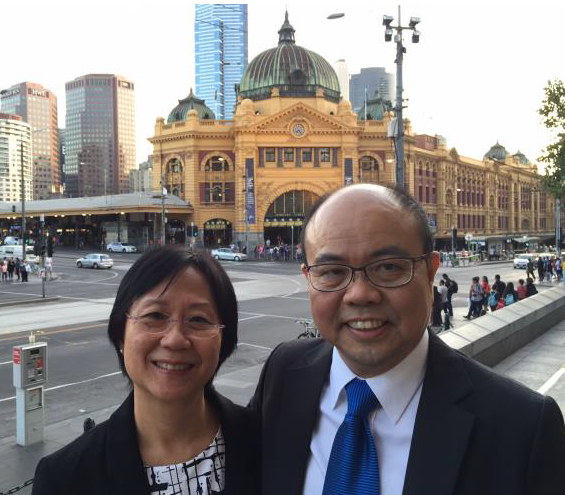After London's terror attack, should I still evangelise my Muslim neighbour?
The threat of terrorism, the legacy of colonialism and rapidly rising religious persecution make this era one of the most challenging for 'missionaries' – if such a thing still exists.
Even the word itself is rarely used. Different organisations tend to say 'workers' or 'staff' to avoid the uncomfortable colonial overtones of clever white man teaching less-clever ethnic man the difference between right and wrong.

All this makes BMS World Mission's decision to appoint its first non-western general director of world mission all the more poignant.
Dr Kang-San Tan currently lives in his home country of Malaysia and will move to Didcot, Oxfordshire, to take up the role in the autumn.
'From a non-western perspective I want to encourage British churches that God is still working through mission,' he says unapologetically in an interview with Christian Today. 'Although the church is declining in the West it is on the rise in South America, in Africa, in Asia and around the world.'
Dr Tan is under no illusions the role of missionary organisations like BMS World Mission is rapidly changing.
Gone are the days of Westerners descending on villages like travelling salesman, offering the promise of eternal redemption before disappearing in brand new 4x4s.
'It is no longer just sending workers to go and learn the language and the culture because there are a lot of national mature church movements,' says Tan.
Despite the caricatures, the abundance of national church structures now in existence is testimony to the success of bygone missionaries.
Now the role of Western missionaries is not dead, says Tan. It just needs to be more strategic.
'We still have a lot to contribute. Even if we just contribute our past mistakes.'
He points to burgeoning mission movements in Brazil, Asia and parts of Africa that are sending Christians to their own regions and even in some cases to re-evangelise post-Christian Europe.
'Often the best evangelists are already in context,' he says. 'But in terms of training and in terms of partnership there is still a great need for workers from Britain.
'A lot of these non-Western mission movements are just beginning to send missionaries and issues like member care and contextualisation are still relatively new.
'Sometimes they make the same mistakes as missionaries made in the past.'
In terms of theological education, advocacy and other areas of training, Westerners still have a huge amount to contribute, he says.
'At BMS we will position ourselves to work in close partnership with non-Western missionary movements but I think it is also important for British churches to know that God has not left himself without witnesses. But the best witnesses to Hinduism and Islam are really coming from their near neighbours.
'It's an exciting time.' He repeated that phrase a number of times over the course of the conversation.
Speaking of his own vision for BMS, he spoke of decentralisation and the need 'to recognise that God has raised up global south Christians from Latin America, Africa and Asia and increasingly we will develop strategic partnerships with these movements'.
Tan's appointment comes 281 days after the UK voted for Brexit, 142 days after the US voted for Trump and eight days after an 'Islamist inspired' terror attack hit London.
Whether these events were driven by fear and division or not, they have undoubtedly raised tensions with hate crimes against religious and ethnic minorities on the rise.
Despite the protestations of Church leaders, with 81 per cent of evangelicals backing Trump, Christians have undoubtedly played a part in the escalating fear, in particular, of Muslims.
'This is where many mission movements could contribute,' says Tan.
'The church in the West has much to learn and receive from the Asian Church who for hundreds of year have learnt to live sensitively hand in hand with other religions and yet bear witness to Christ.
'Christians in the West are now seeing many more Muslims and Buddhists in particular and this is a growing issue.'
'You can look at it from a pluralistic perspective', he says, and say it doesn't matter everyone goes to heaven.
'Or you can see it that they are all enemies of Christ but not be willing to see that God in his sovereign hand has brought the nations to our door steps.
'We need a new a theology to hold these in tension.
'Other religions are good and yet not salvific,' he says with all the simplicity of someone who has grown up surrounded by other faiths and beliefs. For Tan, mass migration and multiculturalism is not a threat but an opportunity for Christianity: 'What a privilege God has given us to have brought all the nations to our doorstep.'
He continues: 'In a post-Brexit climate with developments in the US where migrants are everywhere, how can the Church in the West learn from mission movements such as BMS where missionary workers have lived for many years in Islamic contexts and in Buddhists contexts?
'It is an exciting time,' he says again.
'Pluralism is not the answer but it's the ability to dialogue, to give hospitality – all of these things that Asian Christians have tried to do.
As he speaks, his own background surrounded by Muslim friends and neighbours in Malaysia is evident.
By all means evangelise, he says, 'but not in a way of forcing our gospel tracts or evangelism through theology but through love and saying, "This is a gift we have received."
'Often in the context of friendship we do not have a problem.
'Where problems arise is where we have over-zealous Christians who just want to convert people without the context of relationship and humble listening.
'We need to encourage those mutual sensitivities.'











